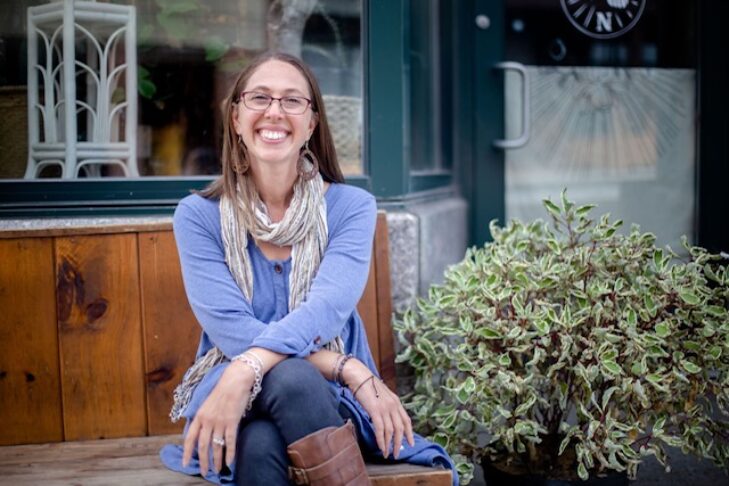Welcome to the latest in our doula series, in honor of World Doula Week. Today we’re chatting with Shari McBurney from Deep Seed Doula about what really happens in the delivery room.
What drew you to this career?
When I turned 36, I re-evaluated what I was doing with my life, my pathway and what kind of mark I was making on the world and in the parenting of my two girls. It was a real moment of reflection, and so I made the most of it by pursuing a weird little interest of mine in births. My background was in hospitality. I was a chef and the director of training for various places, including Legal Sea Foods and Dunkin’ Donuts. It feels very much in the same vein to provide hospitality for the folks that I’m serving.
What do you love about it? Was there a personal connection?
I almost hate to say it, but I guess it was a little bit of a calling. I moved into an old house. It was built in 1846. Evidently, this is the home where the women in the neighborhood and in the surrounding area came to birth because it has a birthing room. The town historian let me know that when he found out that I was a doula. And I said, “Gosh, I didn’t really have a reason for this calling, and now I wonder if it wasn’t just some spirit floating around in the house saying, ‘You’re going to do birthing!’”
But mostly, the truth is, I love talking to pregnant people, primarily because I know that there are many people who feel pregnancy differently. I had hard pregnancies. And I didn’t love being pregnant either time, and so just being a listening ear to some who are struggling through pregnancy, struggling to get pregnant, over to the folks who love being pregnant and can’t imagine not being pregnant. There’s a wide array, and I just enjoy talking to all of them.
What do you do as a labor doula?
A birth doula or a labor doula is a bit of a birth consultant—a birth buddy, if you will, helping people to be aware of options that sometimes are inaccessible to them or that they’re just not sure how to find or don’t know how to filter through. Dr. Google will give you everything from point A to point Z, and to translate which ones are the right ones for any particular person is tricky.
We, as pregnant people, rely on word of mouth, on other people’s stories, other people’s experiences, not realizing just how much those choices will affect our own birth memories. And so I enjoy being part of a family’s exploration of their options, be it birth setting, type of provider, midwife or doctor, home birth or hospital birth, do I want an epidural or not.
A lot of preparatory education goes into those relationships, and if I get to be a part of that pregnancy for any amount of time, then we can highlight what those choices are and how someone can make a choice that feels most authentic to them. My role specifically is not to make decisions for someone, to speak for someone or tell them the right way to go. Maternal culture does enough of that: Don’t eat sushi. Don’t drink wine. I’m here to help people understand what decisions may be right given their own autonomy.
What kind of questions do you get from families? What are pregnant women thinking about?
I think that folks are looking for a certain level of translation of the maternity care system. It’s a little convoluted, and it’s a little one-size-fits-all and truly winds up being one-size-fits-few. I am not going to be a deciding factor on whether someone should induce their labor, but rather: “What should I expect from an induction? Is this a reason for induction? How will it be different than going into labor spontaneously?”
I think that folks are looking for guidance on how [choices] are going to affect their birth memory. And that’s a realm that I’m comfortable in. As a non-medical professional, I’m not saying this is a legit or not legit reason to induce, for instance. It’s, “How are we going to weather this?” People want a translation of some of those choices, to see if a recommended procedure is right for their particular circumstance and to help it feel safe to them, to create a space that gives them a way to understand more of what’s happening to them.
What happens in the delivery room?
There is some demystification around, “Is this labor, and when does it stop?” I help them to determine that path of action and when to make those moves so that we arrive [at the birthing center] at an auspicious time, meaning not too early and not too late. And then I provide hands-on support for both the woman as well as her partner during that labor process and partner with the providers so I have a good sense of what’s happening in the room to help her feel safe. A lot of people come with fear and doubt, and so I’m there to help reduce as much of that as I can.
What are some of the common fears?
There are folks who come with a history of trauma, and they have known triggers for things. They need to feel control, or they need to be allowed to be vulnerable. This can be a strange place, a scary place for people who have a history of sexual or physical trauma. So that may be one side of it. Another side is distrust of the medical system, where they’re just needing to better understand: “How does this serve me? Is this right for me? Maybe what medically what makes sense for 10,000 other women might not be right for my pregnancy.”
Some have wishes for birth that they don’t know how to achieve or they are afraid of the pain, or also afraid of an epidural. In some other cases, a laboring person needs her partner to be empowered so that he or she can contribute and be present for the labor with some level of care for themselves, because the big role for a partner is to be the caregiver, as well as the nervous parent. Sometimes we try to make room for all of their emotions as well.
Especially in COVID times, when going to the hospital feels scary and being in a medical setting could feel scary, do you have words of wisdom?
At a baseline, a doula is the tour guide. My words of wisdom are to look for the experienced illuminators, the people who have seen women through this process because women are resilient. People, humans, are resilient. Laboring people are warriors, and so they have what it takes to get through it, but they need to be able to trust the environment they’re in. And a doula should at baseline be able to make the space feel safe for a woman to birth in.
What techniques do you use when clients get nervous? As someone who had an unplanned cesarean section, I know even the best-laid plans can go out the window.
I think there’s a very significant difference between coping and suffering—so, in the moments of labor, to understand that suffering is not actually a requirement of labor and birth. A laboring person can trust her environment, can trust herself, her body, her baby and listen to that body and what it’s trying to tell her, listen to that baby and what it’s trying to tell her—if she can maintain a rhythm through her labor, through the contractions even as they intensify, if she can see within coping that she can maintain that sense of birthing in her power. If she loses that, either because of acute pain, unexpected outcomes, the emergency cesarean-type things, things that make her adrenaline race, unexpected pain that’s out of the norm, not just the pain of labor, but the pain of the baby in a bad position, such as back labor, these are things that could cause a person to cross the line from coping into suffering.
Suffering should be remedied, and it needs to be heard and listened to. We have to say, “We see you in this place and we are going to help,” because suffering is scary. It’s panic-inducing. And it’s what she will remember of her birth story. And so my goal is to help reduce that fear by being a beacon of calm, of translating what’s going on around her because I have the ability to do that as a non-medical professional, not directly involved in the clinical care. I am the person who can use my words to talk with her, tell her what’s happening around her if there’s something that is rising to the level of emergency, help calm a partner about what to expect if we go to a cesarean, for instance, or if there’s a heart rate deceleration, something to that effect. I might do that through breathing, or I might do that through visualization or I might do that by calm explanation of what’s happening.
How has Judaism influenced your practice?
Being Jewish has historically meant we’ve needed permission to just be, sometimes against great obstacle. Birth asks for this permission, too, even as at times the medical model seeks to control the primal power of physiology. When we let birth be, it can be transformational, even spiritual when it’s done, [though it] might not feel that way during the labor!
Further, being Jewish means to own our rituals and have space to be inside them. Labor requires rhythm to cope through the waves, the contractions, the pushing efforts; rhythm is the foundation of ritual, after all, that it’s repeated and meaningful even at times of struggle. Being a Jewish doula means I make a safe space for those rhythms for all I support in this process, both physical and emotional.
Lastly, at a Jewish wedding, we break the glass to remind us that to know true joy, we conjure to mind the meaning of true sadness or pain. Labor is comfortable for no one; it’s hard and long and trying for many. But the joy that is literally borne of its efforts is that much sweeter. I keep that imagery with me all the time and am grateful for the chance to witness both during the course of every birth I support.
Best piece of advice for a soon-to-be mom?
A woman has a choice about the team and the people she chooses to support her in labor. She has the power to select her partner, her provider, her birth setting and the folks she surrounds herself with to bring in peace and safety at a time where she needs to be able to rely on that trust. She needs to be able to feel safe in her labor den. If I as a doula get to be a part of that, I feel that that’s the triumph. She will remember how she was treated. And so I want to be a part of the treatment she remembers with happiness, with contentment, with peace and with power.





